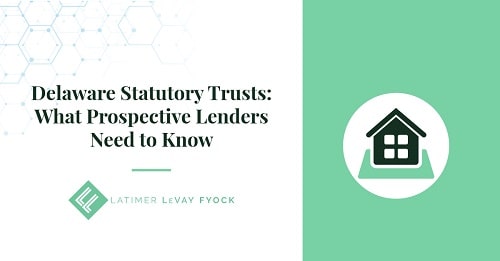Delaware Statutory Trusts: What Prospective Lenders Need to Know

If lenders that finance the acquisition of commercial real estate or large multi-unit residential buildings were to write a wish list of characteristics they were looking when underwriting such loans, that list would likely contain some or all of the following:
- Investment-grade property
- Professional, institutional, and experienced management
- Long-term leases with a strong anchor tenant
- Borrower with solid financials and reserves
- Simplified transaction and due diligence with a single borrower
- Bankruptcy-remote such that the property is out of reach of investors’ creditors
- Protection from individual investors’ bad acts
- Borrower prohibited from renegotiating existing loans or leases.
The foregoing qualities are what can make properties acquired, owned, and managed through a Delaware Statutory Trust (DST) such an appealing opportunity for lenders. This unique form of property investment and ownership has been around for a while but only truly found its footing after the 2008-2009 financial crisis. With the economy now facing another round of volatility and upheaval, DSTs may provide an option as investors look for ways to diversify their asset portfolios and minimize their risks.
What is a Delaware Statutory Trust?
Created under Delaware Law, a DST is a specialized legal entity in which a sponsor firm, acting as trustee, acquires the property, holds the title, and guarantees the mortgage loan. These sponsors are usually seasoned real estate developers and managers that own and operate multiple properties and have the ability to be more discerning in their investment choices than smaller, non-institutional investors. The sponsor firm may act as a master tenant of DST-owned commercial real estate depending on the type of property. Typically, DST properties are institutional-grade commercial properties, including apartment buildings, office buildings, retail buildings, and shopping centers.
Acquiring an interest in a DST is an attractive choice for real estate investors because it allows them to pool resources with other investors to purchase a larger, higher-quality real property asset than what they would be able to afford, and finance, on their own.
Importantly, the beneficial interests in a DST can qualify as a 1031 exchange replacement property, making it an even more attractive option for investors. The investment in a DST is an exclusively passive one; investors have no voting authority, and their only right with respect to the DST is to receive distributions.
The “Seven Deadly Sins” That Are Virtues For DST Lenders
The IRS has held that an interest in a DST can be treated as replacement property for a 1031 exchange. But the 2004 ruling in which the IRS made that determination, IRS Revenue Ruling 2004-86, also imposes several limitations on the authority of DST trustees. These “Seven Deadly Sins,” as they are often referred to, accrue to the benefit of DST lenders insofar as they reduce their risk and enhance the security of their loan facility.
Those “sins,” as outlined in the IRS ruling, are:
- Once a DST offering closes, neither current nor new beneficiaries can make any future capital contributions to the trust.
- The trustee cannot renegotiate the terms of the existing mortgage loans, nor can it obtain any new mortgage financing from any party except where a property tenant is insolvent or bankrupt.
- The trustee cannot enter into new leases or renegotiate existing leases except where a property tenant is bankrupt or insolvent.
- The trustee cannot reinvest the proceeds from the sale of its real estate.
- The trustee may only make the following types of capital expenditures with respect to the property:
- expenses for routine repair and maintenance of the property
- expenditures for minor nonstructural capital improvements of the property, and
- costs for repairs or improvements required by law.
- Any cash held by the trust between distribution dates can only be invested in short-term debt obligations, and
- Trustees must distribute all cash, other than necessary reserves, on a current basis.
Additional Considerations For Lenders
Since the DST will own 100% of the fee interest in the real estate and is the sole borrower, the lender only makes one loan to one borrower. Additionally, DSTs contain special purpose entity provisions that prevent the bankruptcy creditors of the beneficiaries from reaching the DST’s property. While the loan to a DST must be nonrecourse loan, the sponsor may be able to provide a guaranty, albeit limited.
Contact Latimer LeVay Fyock With Your Questions or Concerns About Delaware Statutory Trusts
Delaware Statutory Trusts aren’t widely known or understood. Even seasoned lenders may have minimal experience issuing loans to DSTs. At Latimer LeVay Fyock, the attorneys in our Banking, Finance & Creditors’ Rights Group, provide counsel to lenders offering financing to DSTs. We have experience with these entities and can help our banking clients understand the structure and requirements so they can make prudent lending decisions.
Please contact us to discuss DST opportunities.


